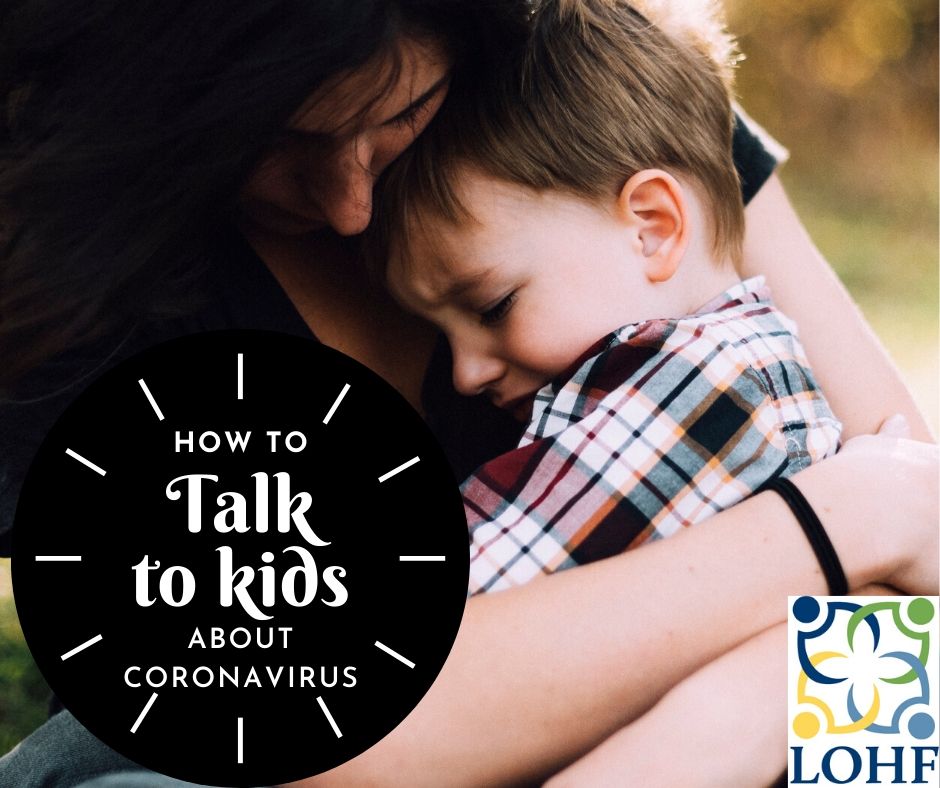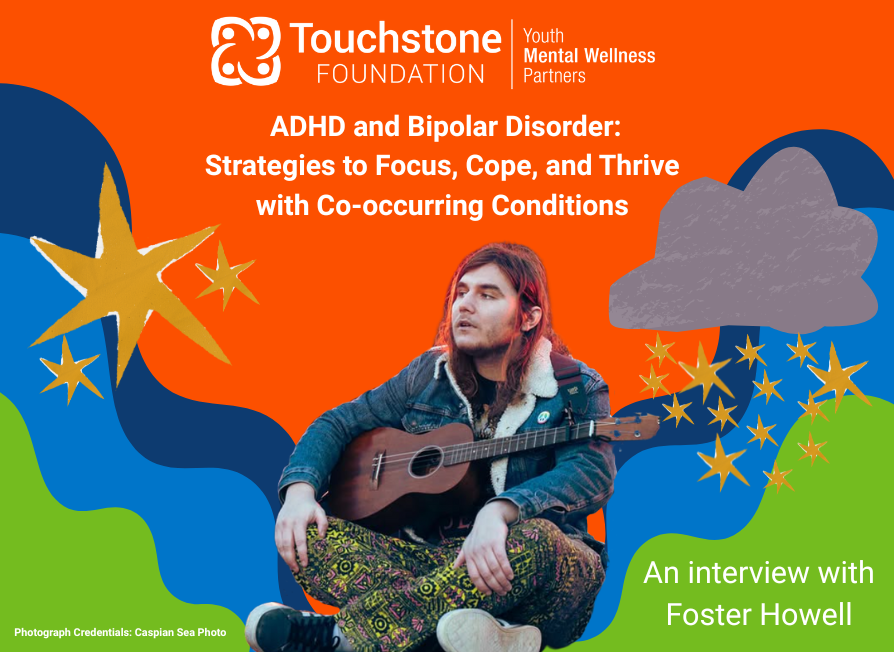
By John Walker (LOHF Board Member) and Adam Biuckians, MD (LOHF Board Chair, Medical Director and Child & Adolescent Psychiatrist at CSG)
When I (John) arrived at the grocery store today, I was shocked by what I saw. Lines were 10 deep at the checkout and shelves had been swept clean of canned foods, toilet paper, bottled water and cleaning supplies. There was a palatable feeling of anxiety there with grim faces and tight body language.
News of the coronavirus pandemic has closed schools, shuttered workplaces and sent people scrambling to prepare. What we see on TV and read online has been a haphazard and alarming set of suggestions from a variety of sources mostly focused on stemming the spread of this virus. We’re not clear what’s going to happen and we’re all feeling anxious.
And here’s the thing. At times like these we have to do more than take care of our physical health, we have to care for our emotional health too, and support our kids at the same time.
That’s especially important because the framework that supports our emotional health is being jarred and our ability to maintain our emotional health is compromised. Our daily routines are being disrupted; our access to friends is limited; we face financial uncertainty from work; our children are anxious; and we feel grave uncertainty. But there are ways to cope and we want to share them.
Helping your kids (and you) cope mentally
What follows is a conversation with my friend Adam Biuckians who is an authority on behavioral health issues. Adam is Medical Director and Child and Adolescent Psychiatrist at Community Services Group in Lancaster. He is also Board Chair at LOHF, where I also serve on the board.
How can we take steps to manage our own anxiety over this situation?
I suggest staying connected with our social networks, including friends, co-workers, and family. Talk to and receive support from one another. Infectious outbreaks can isolate people in fear and anxiety, so we need to stay connected.
I also suggest limiting media exposure. Although we need to stay informed, we should minimize exposure to media outlets or social media that might promote fear or panic. Graphic imagery and worrisome messages will increase our stress and can reduce our ability to handle this situation appropriately and effectively.
We should monitor ourselves over time for any symptoms of depression or a stress disorder: prolonged sadness, difficulty sleeping, intrusive memories, hopelessness. Talk to a peer, supervisor, or seek professional help if needed.
How should we talk with our kids about this situation?
There is no denying these may be difficult conversations to have with our kids, but they are important. There are no right or wrong ways to talk with children about public health emergencies such as this, but here are some suggestions that may be helpful:
- Create an open and supportive environment where children know they can ask questions. At the same time, it’s best not to force children to talk about things unless and until they’re ready.
- Answer questions honestly. Children will usually know, or eventually find out, if we’re “making things up.” It may affect their ability to trust us in the future.
- Use words and concepts children can understand. We should gear our explanations to the child’s age, language, and developmental level.
- Acknowledge and validate children’s thoughts, feelings, and reactions. Let them know that we think their questions and concerns are important.
- Let children know that there are lots of good people helping those affected by the coronavirus outbreak. It’s a good opportunity to show children that when something scary or bad happens, there are people to help.
What else should we know about helping our kids understand and cope with this situation?
Children learn from watching the important adults in their life. They will be very interested in how we respond to news about the coronavirus outbreak. They also learn from listening to our conversations with other adults.
Be reassuring, but don’t make unrealistic promises. It’s fine to let children know that they are safe with us and other trusted adults. But we can’t promise that there will be no cases of coronavirus in our community.
Don’t let them watch too much television, especially shows with scary images or messages. The repetition of such scenes can be disturbing and confusing, and will increase anxiety.
It’s also helpful to remember that while adults may follow the news and the daily updates with interest and attention, most children just want to be children. They may not want to think about what’s happening across the country or elsewhere in the world. They’d rather play games, climb trees, ride bikes, draw, make crafts, etc.
What should we say to our kids about all the school closings?
Try to frame the closings in as positive a way as possible. We could say something like “School is closed to make sure they get all the yucky germs out, so we’re going to stay at home and do other things while they clean it”.
Make the most of the unexpected time at home with our kids: play games with them, read books together, help them do crafts or other projects, things like that.
We should maintain a routine as much as we possibly can. Routines can promote a sense of control over something for kids, which can help reduce anxiety.
What should we look for in our kids that may clue us in that they are really struggling?
Children who are constantly asking questions or concerns about the coronavirus outbreak should be evaluated by a trained and qualified mental health professional. Signs that a child may need additional help include: new and ongoing sleep problems, intrusive thoughts or worries, recurring fears about illness or death, and reluctance to leave parents or go to school. If such behaviors persist, ask your child’s pediatrician, family physician or school counselor to help arrange an appropriate referral.
It’s also important to know that children who have experienced serious illness or losses in the past are particularly vulnerable to prolonged or intense reactions to scary news reports or images of illness or death. These children may need extra support and attention as well.
How can we stay plugged in to our social networks even if we have to be physically separated?
This is really important, as our social network is an anchor of support. Email and texting may be the best ways to stay in contact with others during an outbreak, as the Internet may have the most sensational media coverage and may be spreading rumors. We should also check in regularly with our children about what they have viewed on the internet and clarify any misinformation.
What daily habits are helpful to maintain our emotional health and that of our children?
Remember to tend to our basic needs. Eat, drink, exercise, and sleep regularly. Depriving ourselves of these needs puts us at risk and may also reduce our ability to handle this situation appropriately and effectively.
Whenever possible, we should allow ourselves to do something comforting, fun or relaxing. Taking a walk, listening to music, reading a book, doing a favorite hobby, or talking with a friend can help.
Any other thoughts?
Public health emergencies are not easy for anyone to comprehend or accept. It is natural for us to feel frightened and confused. We can help each other by listening and responding in an honest, consistent, and supportive manner.
Helpful Resources
For more information and resources, please check out the following links.
How to Talk to Kids About Coronavirus (NY Times Parent) Keeping your own anxiety in check is key …
How to Talk to Kids About Coronavirus (American Academy of Child & Adolescent Psychiatry) Although these may be difficult conversations, they are also important …
CDC Website for updates and resources for families. Easy to navigate homepage for all current CDC information and resources about the COVID-19 pandemic.
Managing Fear and Anxiety (CDC) Fear and anxiety about a disease can be overwhelming and cause strong emotions in adults and children. Coping with stress will make you, the people you care about, and your community stronger …




